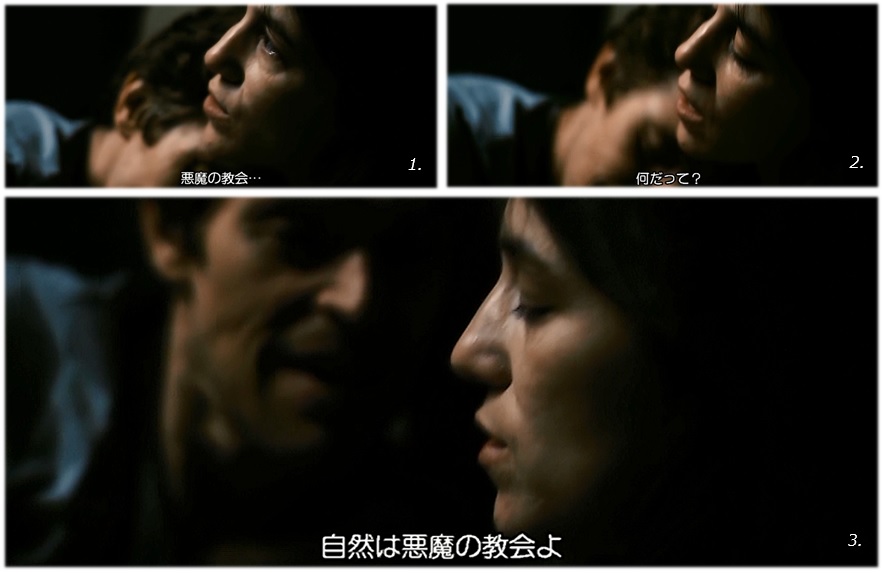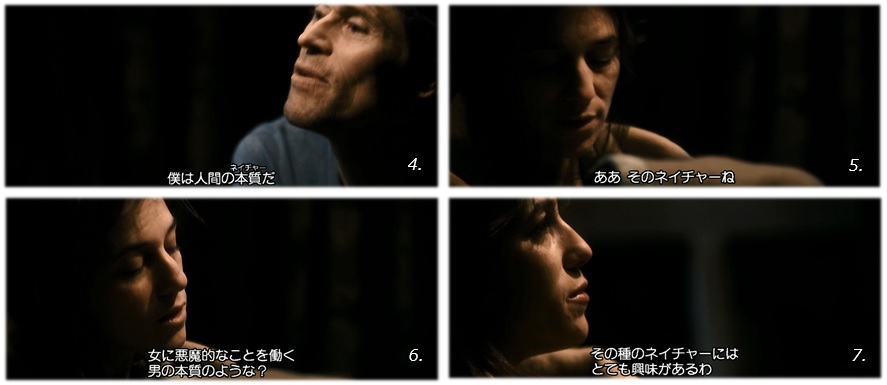![]()

監督 ラース・フォン・トリアー
公開 2009 年

1章 崩壊する男女関係

ラース・フォン・トリアーがこの映画で描き出そうとしているのは、崩壊する男女関係の、しかも女性の側に比重を置いた崩壊過程の、話だと言う事が出来るでしょう ( *A )。セックスに夢中になっていたシャルロット・ゲンズブールとウィレム・デフォーの夫婦の近くで息子が転落死してしまうスローモーション映像 ( それは観る者に美しさを感じさせる倒錯的な映像でもある ) で話が始まるのですが、そこでは最初から夫婦の繋がりの象徴である子供の存在は排除されている。
つまり、彼らは夫婦ではなく、夫婦以前の男女として描かれる。それは結婚し夫婦となり子供が出来ても、安定とは程遠い不確実で破裂しかねない緊張が奥底に潜んでいる事を明らかにしようとするものであり、男と女という異なる人間同士が結びつく時に起こる問題を示すものでもあるのです。
その事はシャルロット・ゲンズブールとウィレム・デフォーの夫婦自身が、お互いの関係性を精神的な意味での夫婦に昇華する事が出来ず、未だ問題を抱えた "男女" である ことを露呈させます。特に妻の方がその事に対して根強い気持ちがあるといえるのです、この映画においては。
というのも、後の回想シーンでセックスの最中に、実は妻の方が、息子が窓際によじ登っていくのを見ているのが明らかになるからです。という事は、息子が転落する予兆にも関わらず、見て見ぬ振りをしてセックスに没頭していたのですね。
ならば妻は何に対して罪悪感を覚えたのでしょう。答えは、偶然にでも子供を死なせてしまったという後悔ではなく、子供が死んでも構わないと瞬間的にでも思い、セックスに没頭した自分の肉欲に対してだといえるでしょう。
![]()
( *A )
トリアーの映画の本質としての崩壊作用については、以下の記事を参照。

2章 自分をコントロール出来なくなるという女の本質

ということは、よくいわれるように妻は子供の転落死をきっかけに精神を病んでいったというよりは、自分の中の、いや 自分を超えたエデンの森という環境的自然 ( ネイチャー ) で言い表されるように、制御出来ない 母なるものの本質 ( ネイチャー ) に支配されていったと言うべきでしょう。もちろん、ここから女性が、男性の肉体にはない自然とつながっている周期的な生理現象の哲学的意味を考える事も出来ますね。自分の中に自分を超え出る本質を抱え込んでいるという事こそ女性の "魔女性" というべきものなのです。
人間を取り囲む環境的自然 ( ネイチャー ) = 主体を超えた女性の本質 ( ネイチャー )。( 1~13 )



セックスの最中に殴ってと無茶なお願いをする妻。自分を制御出来ずに暴走が止まらない ( 14~19 )。

さらに暴走は止まらず、野外に出ての激しい自慰行為。もうここまで出来る女優は世界中でもいないのではないかと思わせる凄さを見せるシャルロット・ゲンズブール ( 20~23 )。

自分の本性を知った夫が逃げ出すのではないかという思いから、罵倒しつつ上から夫を攻める妻のサディズムが炸裂する。ここまで来たら夫は逃げ出すしかない ( 24~29 )。


3章 トリアーの真実

妻の束縛はエスカレートしていき、砥石器で夫の足を貫き固定するという束縛にまでいたるのですが、最終的に夫は妻を殺す事によって妻との関係に終止符を打ちます。ここに至るまでの過程には、過激な描写が行われていて、観客の道徳観念を挑発するものであるのは間違いないのですが、それだけしか見なければ、この映画からいかなる解釈も引き出す事は出来ないでしょう。
というのも、トリアーが男女関係の崩壊を描いているのは確かだとしても、それが女性的なるものの恐ろしさ、女性が自分ではどうにもする事が出来ない獰猛さ、によるものだとする視点にトリアーが無意識的に囚われているかもしれないからです。
何が言いたいかというと、トリアーが女性差別主義者だという事ではなく、女性 ( ビョーク、二コール・キッドマン、シャルロット・ゲンズブールなど ) こそがトリアーの作品の中心的役割を果たしている事を考えれば、トリアー自身が女性的なものの獰猛な本質の中に、自分の映画作りの真実を無意識的に求めているかもしれない という事なのです。世間体や道徳観念などの枠組みを無視した、あるいは挑発した映画作りは、既存の形式性によって自分の衝動を表すというより、形式性に囚われない衝動をどうにかして表そうという極めて "女性的な振舞い" であるかもしれないのです〈 終 〉。

〈 English version 〉
▶ Thinking philosophically about Lars von Trier's film "Antichrist ( 2009 )".
![]()


1. collapsing relations between men and women

a. What Lars von Trier is trying to describe in this film is collapsing relationship between a man and a woman, even collapsing process that puts more emphasis on the woman's side ( *1 ). The story begins with a slow-motion picture of Charlotte Gainsbourg and Willem Defoe's son falling to his death near their sex-obsessed married couple ( it is also a perverse image that gives the viewer a sense of beauty ), but from the beginning, the existence of the child, the symbol of the couple's connection, is excluded.
b. In other words, they are described not as husband and wife, but as a man and a woman before marriage. It is an attempt to reveal that even after they get married and have a child, there is still an uncertain and potentially explosive tension lurking in the depths of their relationship that is far from stable. It also shows the problems that occur when two different people, a man and a woman, come together.
c. This exposes that the couple of Charlotte Gainsbourg and Willem Defoe are still a troubled "man and woman" who have not been able to sublimate their relationship into an internalized marriage. The wife, in particular, has deep-seated feelings about this, in this film.
d. Because it becomes clear in a later reminiscence scene that during the sex, the wife had actually seen her son climb up to the window. This means that despite the signs that her son was about to fall, she pretended not to see him and was immersed in sex.
e. Then what did she feel guilty about? The answer is not regret for accidentally letting the child die, but for her own carnal desire to have sex with husband, thinking for a moment that she didn't care if the child died.
![]()
( *1 )
▶ For more on the collapsive effect as the essence of Trier's films, see the following article.

2. The essence of Woman that she loses control of herself.

a. So, as is often pointed out, wife did not become mentally ill as a result of the death of our child by a fall, but rather she became dominated by the uncontrollable the essence ( Nature ) of Mother , as expressed in the environmental nature ( Nature ) of the forest of Eden within and beyond herself. Of course, from this we can also consider the philosophical meaning of the cyclical physiological phenomena of women being connected to nature, which is not found in the male body. The fact that a woman holds within herself an essence that transcends herself is what I would call her "witchiness".
b. "The environmental nature ( Nature )" that surrounds human beings. = "the essence ( Nature )" of women beyond the subject ( 1~13 ) .



c. Wife makes a reckless request to her husband to hit her during sex. She can't control herself and can't stop running wild ( 14~19 ).

d. And the outbursts don't stop, she goes out in the open air and masturbates vehemently. Charlotte Gainsbourg shows us that there is no other actress in the world who can do this much ( 20~23 ).

e. The wife's sadism explodes as she attacks her husband from above while cursing him out of fear that he will run away when he discovers her true nature. The husband has no choice but to run away ( 24~29 ).


3. The truth about Trier

a. The wife's bondage escalates to the point where she uses a whetstone to pierce her husband's leg and immobilize him, and finally he ends his relationship with his wife by killing her. The process leading up to this point is described in series of extreme scenes that will definitely provoke the audience's moral sense, but if we only see that, we will not be able to draw any interpretation from this film.
b. The reason is that even though Trier is certainly describing the collapse of the relationship between men and women, he may be unconsciously trapped in the perspective that this is due to the horror of Woman, the ferocity that women cannot control.
c. What I mean, thinking not that Trier is a misogynist, but that just women ( Bjork, Nicole Kidman, Charlotte Gainsbourg, etc. ) play a central role in his films, he himself may be unconsciously seeking the truth of his filmmaking in the ferocious nature of the Woman. It means that Trier himself may be subconsciously seeking the truth of his filmmaking in the fierce essence of Woman. Filmmaking that defies or provokes the frameworks of public opinion and morality may be a very "Woman behavior" that somehow tries to express impulses that are not confined by formalities, rather than expressing one's impulses through existing formalities ( End ).
